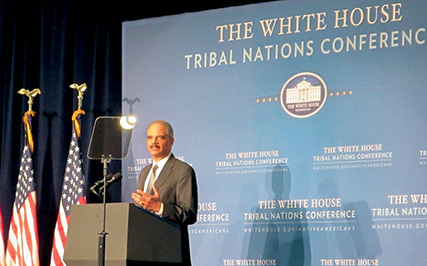Tribal Government & News
Mercier attends sixth annual White House Tribal Nations Conference

WASHINGTON, D.C. -- Tribal Council member Chris Mercier represented the Grand Ronde Tribe at the sixth annual White House Tribal Nations Conference held Wednesday, Dec. 3.
The annual conference invited leaders from the 566 federally recognized Native nations – more than 300 attended -- to meet with President Barack Obama, Cabinet officials and the White House Council on Native American Affairs regarding key issues facing Tribes, including respect for Tribal sovereignty and the federal government upholding treaty and trust responsibilities.
“I found the conference to be very inspiring and a good reminder of why it is so good to be working in Indian Country these days,” Mercier said. “The administration has proven that it takes the challenges confronting Tribal nations very seriously.”
Secretary of the Interior Sally Jewell gave the opening remarks, where she emphasized the Obama administration’s commitment to Indian Country.
“All of the work we are undertaking in partnership with Tribes – whether on education, tackling climate change or upholding trust reforms and treaty obligations – is with an eye toward the health and prosperity of the next generation,” Jewell said. “The White House Tribal Nations Conference is one piece of President Obama’s commitment to make meaningful and lasting progress in support of American Indian’ and Alaska Natives’ vision for a strong and successful future.”
Jewell oversees the Bureau of Indian Affairs as Secretary of the Interior.
She also chairs the White House Council on Native American Affairs, which includes the heads of more than 20 federal departments and agencies. It has convened four times since its inception in June 2013 and works to improve inter-agency coordination and expand efforts to leverage federal programs and resources available to Tribal communities.
Assistant Secretary for Indian Affairs Kevin Washburn, who leads the BIA, also participated in the Tribal Nations Conference. “Each of the administration’s successes is progress for Tribes because Tribal self-determination and self-governance animate each of our programs,” he said. “Our programs cannot fully succeed unless Indian Tribal governments also succeed.”
At the opening of the conference, Vice President Joe Biden spoke about violence against women in Indian Country.
“The most horrific prison on earth is the four walls of an abused woman’s home,” Biden said. “For far too many Native American women that is a daily reality.”
Biden apologized that it took until 2013 to amend the Violence Against Women Act to allow Tribal governments to prosecute non-Indian domestic violence offenders in certain cases.
“As long as there is a single place where the abuse of power is excused as a question of jurisdiction or tolerated as a family affair, no one is truly safe, and we cannot define ourselves as a society that is civilized,” Biden said.
He urged all Tribal governments to be prepared on March 7 when the law goes into effect to use their authority to aggressively prosecute domestic violence offenders.
“I especially found Biden’s speech on domestic violence in Indian Country moving,” Mercier said. “Biden said the worst abuse of power is raising one’s hand against a woman or a child.”
Attorney General Eric Holder spoke after Biden, stressing the Obama administration’s commitment to improving law enforcement in Indian Country and announcing a new initiative to promote compliance with the Indian Child Welfare Act.
“During the breakout sessions, they took input from Tribal leaders,” Mercier said. “I was one of the last to get to speak, and I urged them to increase funding or in some other way prioritize Tribal law enforcement development. Throughout the conference they emphasized the need for self-sufficiency, public safety and the exercise of sovereignty. Tribal law enforcement touches on all of those areas, and many Tribes are not as well off as us, many being located in remote rural areas with little police presence.”
During his speech, President Obama focused on Native youth, building upon his summer visit to the Standing Rock Sioux Tribe in North Dakota. He made a series of commitments designed to create new opportunities for Native youth, including the establishment of the Generation Indigenous initiative that will seek to identify and remove obstacles standing in the way of Native youth success.
“The United States shares a sacred bond with our Native nations,” Obama said. “We have a sacred responsibility to all our young people, including Native youth.”
He also said he will convene the first White House Tribal Youth Gathering in 2015.
“I got to meet several Tribal Council members from other Tribes whom I had never met before,” Mercier said. “I was reminded that we all face many of the same challenges. There are problems which transcend geography or culture. Tribal governance is a form of nation building, and we are fortunate to be part of it.”
